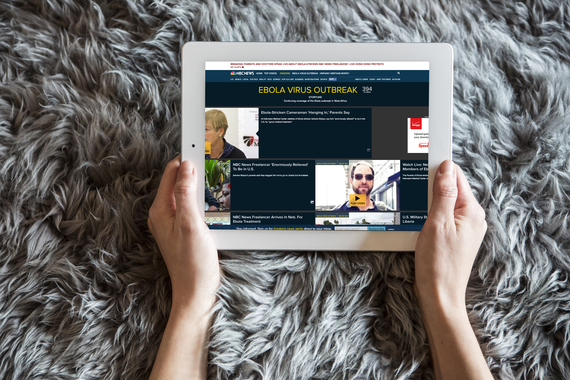EBOLA.
I read, listen to and watch the news in a sort of out-of-body state. Didn't I see this movie?
I'm sure I read the book.
This can't be for real.
The virus is spreading across Africa -- and there are infected individuals in the US as well.
This is the stuff of novels, nightmares -- and sadly, of panic, and panic leads to prejudice and prejudice leads to hatred in a direct and short line. In fact, a recent incident on a flight into the US is frankly scary...
Already Donald Trump has weighed in that some good might come of this epidemic if it eliminates the shaking of hands. There is talk of closing borders and limiting immigration. And I guarantee that is just the beginning.
However my point is not to write a screed against discrimination; rather it is to examine the outbreak in light of our world -- our digital world, our always-on world, our "social is the key to everything" world.
My fear is that we are beginning to look at our personal technology as a totem. The kind of totem that people once thought (and some still do) protected them from bullets or arrows or bears -- bottom line: an unnatural death.
So when we read about Ebola, it has the ring of fiction -- our magical auras protect us. We have smartphones.
Sadly, I will bet that some of the infected and deceased in Africa had them too.
What they didn't have was a good health care system, clinics with running water, proper protection for health care workers, better education, enough medical supplies so that needles didn't need to be reused and a full-court press on finding a vaccine.
So while social media might be getting a foothold, social custom has taken a blow; and in Liberia -- like in many places in Africa and elsewhere -- socializing and physical contact are, no pun intended, hand in hand.
Imagine a country where goats have shared taxis with eight humans; where kissing on both cheeks dates back centuries as a greeting custom; where intimacy is part of life -- imagine you are suddenly told not to pick up your child or feed your sick mother. Imagine.
One solution is of course the Donald Trump idea -- no more handshaking. And another could be to get everyone connected on Facebook so they don't need to see each other.
Donald's solution by the way being the more possible, as so much of Facebook is group selfies and shared experiences -- how boring if Facebook became FaceTime.
Bottom line: If there was ever a Click and Shout moment, this is it. You've seen the movie. You know how it can end.
Michael Harrington, who in 1962 wrote the influential book on poverty in America called The Other America, posited, "If there is technological advance without social advance, there is, almost automatically, an increase in human misery, in impoverishment."
And clearly we have one and not the other over 50 years after this prophecy -- everywhere in the world the "gap" is growing.
Seems to me that it's easy to become complacent, myself included; to believe in our powerful totems, which don't shield us so much as isolate us. Henry David Thoreau had the same worry in 1854 and he never tweeted so much as a line. Listen:
"Our inventions are wont to be pretty toys, which distract our attention from serious things. They are but improved means to an unimproved end." Henry David Thoreau
And there you have it -- imagine if we helped to solve the problems of running water and more needles for rural clinics, not to mention a vaccine, while we experimented with the Twitter buy button. It doesn't have to be one or the other -- particularly if the one is only an improved means...
Social can kill... but it can also save. The original vision of the Web was of a shared community of scientists sharing -- not selfies or cute dog pictures but critical research and ideas.
As I said: It does not have to be one or the other.
What do you think?

